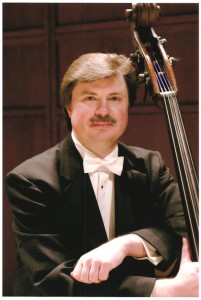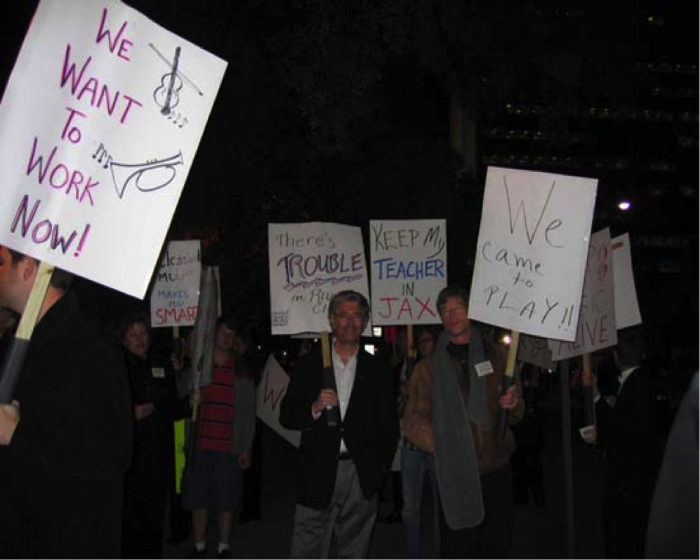
Photo credit: Michael Zirkle
As I sit at my desk to write these thoughts for the next edition of Senza Sordino, it is just after midnight on November 16, 2007. The issue that is foremost on my mind this night, and which has, in fact, dominated my thinking all week, is the egregious lockout of the musicians of the Jacksonville Symphony. I’m sure that all of our readers realize that Senza Sordino is delivered some weeks after the articles are prepared, and therefore it is my sincere hope that by the time you read this article the dispute in north Florida will have been resolved and the citizens of Jacksonville will no longer be deprived of their world-class orchestra. But, even if that best case scenario has occurred, the questions that have led to this situation will no doubt remain for many of our orchestras.
The issues in this dispute have been clear throughout the protracted negotiations. Salary, season length, pension—all of the usual subjects of negotiation that are crucial for our musicians to maintain their craft, care for their families, and serve their communities as selflessly as the most dedicated public servant. But I fear that something more nefarious is really at the heart of the dispute. It seems that the very people who are the stewards of the orchestra are the ones responsible for this terrible situation, and they seem content to publicly express contempt for an institution they are charged with protecting.
An article in the November 13 edition of the Florida Times-Union contained a most dreadful quote from the Jacksonville Symphony board chair, Mr. Jim Van Vleck. Now, I don’t know Mr. Van Vleck. He might be a fine person, and I certainly hope to meet him. Perhaps he found himself befuddled in the middle of an interview and said something hateful and harmful. Certainly that has happened to others when giving interviews, and even experienced politicians and radio shock jocks have uttered ill-informed things.
But, in speaking of the musicians that he is charged with serving, Mr. Van Vleck said, “…there’s something about a 37-week year and 20 hours a week that doesn’t seem too onerous.”
Why would someone who speaks with such contempt for a symphony orchestra ever desire to become chairman of the board of such a great cultural institution?

Jacksonville Symphony musicians have been out of work since they were locked out at midnight on November 12. An unfair labor practice charge has been filed with the National Labor Relations Board against the Jacksonville Symphony Association, which allegedly did not give the mandatory 60-day notice.
Photo credit: Patrice Evans
Let us look at the situation in Jacksonville for a moment. When I first arrived there it was 1987. I had just won an audition for a section bass position, and I was thrilled to be joining the orchestra. I left soon after though, as I won an audition with the North Carolina Symphony, which of course is in the state that I have always considered home.
In my brief time in Jacksonville I found an orchestra ready for growth in a city of seemingly endless opportunity. For the city, my view has been confirmed. In these 20 years, the downtown has grown to become one of the most beautiful cities of the South, with its riverwalk, shopping districts, and, yes, the beautiful home of the Jacksonville Symphony, the Times-Union Performing Arts Center. I have read reports that speak of a 36% growth in the economy there in just the past five years.
And yet, seemingly in defiance of the growth around them, the Jacksonville Symphony has not found leadership that could harvest the opportunities surrounding the streets of their concert hall.
No, instead, those charged to lead the orchestra have embraced the negative rhetoric that has been promulgated throughout the field, and now at this time of crisis they have uttered the absurd assertions that so many of us have heard across the table. It is impossible to believe that so many boards and so many managers stumble across the exact same words by accident.
Those who fail to lead their orchestras always recite the same lines of structural deficit and greedy musicians, as if they fall back on negativity as a last refuge. They must justify their failures in light of all the positive news that is being reported across the country. They must justify their inability to raise funds for an orchestra even though the nonprofit culture industry in America accounts for $166 billion in economic activity every year.
Across America, cities are recognizing the positive financial impact the arts and their orchestras can have in their communities. Inspirational leaders are finding new donors and innovative ways for orchestras to serve their communities.
But, not in Jacksonville. No, in Jacksonville, the musicians are told they should just be happy with partial employment and a nearly 60% cut in their pension. In Jacksonville, they should allow their part-time musicians to suffer losses of as much as $21,000. In Jacksonville, they should just accept the words of a board chair who declares this “not too onerous.” Is there any doubt that this statement will have a negative impact on fundraising for the orchestra in the years to come?
My mood is hard to describe as I write this. I have a sense of dejection, prompted by a little bit of “Googling” as I sought out new information on the situation. I stumbled across a page on the Times-Union website where readers can post anonymous comments to recent news events. Many of you have seen these pages, and as you know, the tone of debate can sink to a level that would make the even most ardent mudslinger cringe.
On this night, November 16, there are 22 postings already, some of them hate-filled attacks on musicians who don’t work “real jobs.” There are references to the “ethereal arts and croissants world of concert musicians.” There are ignorant statements that the symphony is a “second job” for all of the musicians.
It is the world we live in, I suppose, where discord seems more valued than debate. It would be easy to ignore the unrefined rhetoric of an anonymous blogger, but it is disheartening that it seems to have been inspired by the words of a respected member of the community, indeed a person who supposedly cares so much about having a professional orchestra in Jacksonville that he sought to become chairman of the board.
It is even more disheartening to hear the reports from our delegates stating that they have heard the very same words from their board leaders and their managers.
Our orchestras should inspire visionary leaders to speak words of aspiration for the citizens of their community, and not false words of contempt from anonymous bloggers.
George Orwell wrote: “In a time of universal deceit, telling the truth is a revolutionary act.”
Here is some truth: there are some excellent managers in our field, as well as some wonderful boards and board chairs who are dedicated servants of the community. Even with those leaders who are the very best, it is natural that we have some disagreements. The musicians of ICSOM embrace that, and we welcome positive debate.
But when we hear a board chair mock the work week of a symphonic musician, we are not talking about well-meaning disagreements. We are talking about an attempt to justify a failure of leadership.
I am always fascinated by board members. Most of them are extraordinary citizens and successful business people who would not tolerate failure of leadership in any division of the companies they run. But when it comes to symphonies, they seem all too ready to accept excuses for underperformance. This simply defies all logic to me.
As the crisis has unfolded this week, it has been uplifting to watch our musicians and friends respond with positive messages of support. Our communities will hear the positive message of ICSOM, and our colleagues in Jacksonville will prevail.
But on this sleepless night, Mr. Van Vleck’s words echo in my head—a literal echo, as we have heard them before. Let us resolve to challenge them until we never have to hear them again.
“I respect our musicians, but there’s something about a 37-week year and 20 hours a week that doesn’t seem too onerous to me.”
Surely, Mr. Van Vleck was misquoted. Nobody who respects musicians would utter such mindless palaver. I hope to have the opportunity to meet with him so he can tell me what he really meant to say.





